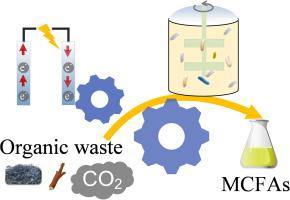Engineering ( IF 10.1 ) Pub Date : 2021-07-31 , DOI: 10.1016/j.eng.2021.03.025 Na Chu 1 , Wen Hao 2 , Qinglian Wu 3 , Qinjun Liang 1 , Yong Jiang 1 , Peng Liang 2 , Zhiyong Jason Ren 4 , Raymond Jianxiong Zeng 1

|
Microbial electrosynthesis (MES) employs microbial catalysts and electrochemistry to enhance CO2 bioconversion to organics with concurrent waste biorefining capability. The aim of this review is to comprehensively discuss the current state of the art and prospects of medium chain fatty acids (MCFAs) production in MES from CO2 and organic wastes. Fundamental mechanisms and development of MCFAs production via conventional fermentation are introduced as well. Studies on MCFAs production in MES are summarized, highlighting the strategy of multiple-electron donors (EDs). Challenges for MCFAs production in MES from CO2 are presented, and the primary discussions included methanogenesis inhibition, adenosine triphosphate (ATP) limitations of acetogens, and production of limited EDs via solventogenesis. Possible applications of electrochemical approaches to promote the bioconversion of actual waste materials with MCFAs production are analyzed. Finally, future directions are explored, including multi-stage reactions, substrate supply, product extraction, and microbial pathways.
中文翻译:

用于生产中链脂肪酸的微生物电合成
微生物电合成 (MES) 采用微生物催化剂和电化学来增强 CO 2向有机物的生物转化,同时具有废物生物精炼能力。本综述的目的是全面讨论在 MES 中从 CO 2和有机废物生产中链脂肪酸 (MCFA) 的现有技术和前景。还介绍了通过常规发酵生产中链脂肪酸的基本机制和发展。总结了 MES 中 MCFAs 生产的研究,强调了多电子供体 (EDs) 的策略。在 MES 中使用 CO 2生产 MCFA 面临的挑战介绍了,主要讨论包括产甲烷抑制、三磷酸腺苷 (ATP) 对产乙酸的限制,以及通过溶剂生成产生有限的 ED。分析了电化学方法在促进具有 MCFA 生产的实际废料的生物转化的可能应用。最后,探索了未来的方向,包括多阶段反应、底物供应、产物提取和微生物途径。































 京公网安备 11010802027423号
京公网安备 11010802027423号